UCL Social & Historical Sciences reflections on COP27
29 November 2022
An expert team of climate researchers from the Faculty were in Egypt in November to represent UCL at COP27, the annual climate action conference held by the UN. Below, colleagues who attended COP27, and others, share some of their reflections and insights from the conference.
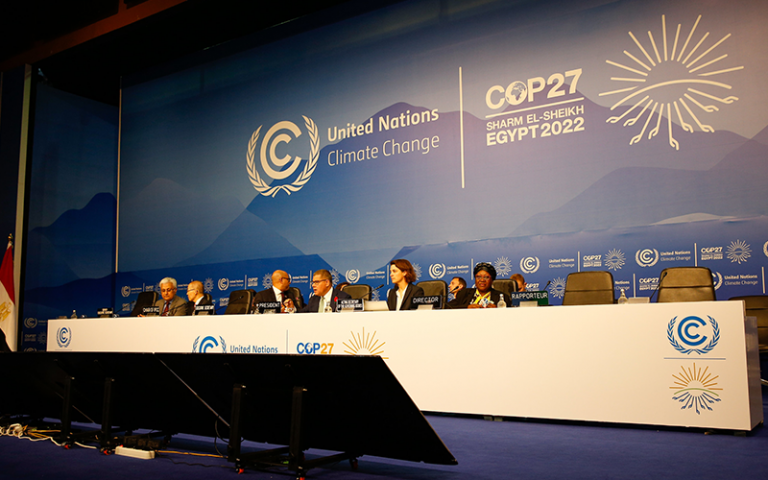
Professor Lisa Vanhala (UCL Political Science)
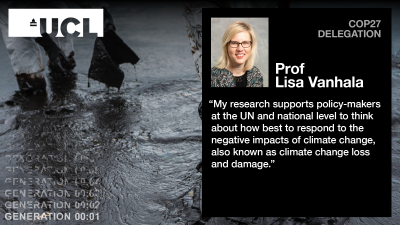
I’ve been leading a small team of early career researchers (thanks to a European Research Council starting grant) studying the governance of climate change loss and damage over the last four years. Simply put, loss and damage are those negative impacts of climate change that we are not preventing or adapting to. Within the UN Climate Change regime negotiations on loss and damage cover a broad range of issues from climate change-related displacement to the losses of life and livelihoods to the economic impacts of trying to recover from, and build resilience to, the impacts of climate change, including storms, floods, glacial melting and sea-level rise.
Our team attends the annual climate change negotiations to undertake ethnographic research and to interview negotiators, scientists and activists. COP27 felt like a critical juncture in the politics of loss and damage and there was more interest, discussion and frustration than there ever has been before. Proposals for funding to address loss and damage have been put forward since before the UN adopted the Framework Convention on Climate Change in 1992 but this is the first year we have seen important progress on the issue with the establishment of a new fund. While our team’s research findings have shown that COP decisions do not always translate into decisive action, we nonetheless see this as an important step forward.
I spent my time in Sharm El Sheikh re-connecting with research participants and collaborators, following the negotiations carefully and speaking with journalists. It was a particular joy to reconnect with former members of our research team: one of our former research assistants, Michai Robertson, was representing the Alliance of Small Island States in the discussions on loss and damage finance and our senior research fellow, Dr Elisa Calliari, was a part of the Italian delegation to COP, providing technical support on loss and damage.
To find out more about our project you can visit our website and follow us on Twitter
Professor Mark Maslin (UCL Geography)
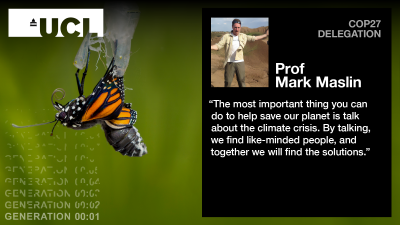
Welcome back to UCL Generation One: The Climate Podcast. We’re back for a two-part series, and part one is coming to you live from COP27 in Sharm El-Sheik. Join Prof Mark Maslin as he takes us through the conference centre, and chats to multiple people along the journey.
Dr Noah Walker-Crawford (UCL Political Science)
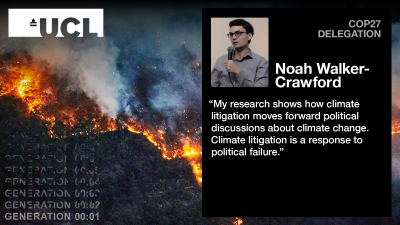
While COP27 produced disappointing results for cutting emissions, there was unexpected success: countries decided to establish a Loss & Damage fund to support the most vulnerable. Around the world, sea level rise, glacial retreat and extreme weather events threaten people’s lives and livelihoods. Global South countries and climate justice campaigners demanded for decades that those who contributed the most should pay for the devastating impacts of global warming. What pushed them over the line?
One factor may have been the threat of climate litigation. With major emitters refusing to accept liability or pay reparations, activists have begun taking fossil fuel companies to court. A Peruvian farmer is suing the German energy giant RWE over its contribution to glacial retreat in the Peruvian Andes. Earlier in 2022, Indonesian islanders took the Swiss cement manufacturer Holcim to court over sea level rise. In the US, around two dozen cities and states including New York City and San Francisco are suing the oil industry over damages in the billions.
Talking to delegates in the Loss & Damage negotiations in Sharm el-Sheikh, many were aware that more legal claims would likely follow if they failed to find a solution. At COP26, Tuvalu and Antigua and Barbuda threatened to explore legal options if negotiations faltered. Litigants such as the Peruvian farming suing RWE were present at COP27 in Sharm el-Sheikh. With pressure from many sides, the European Union and United States reversed their positions and finally agreed to establish a Loss & Damage fund.
Dr Simon Chin-Yee (UCL Political Science)
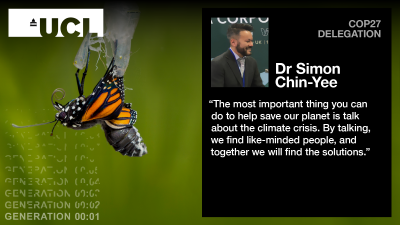
UCL held a workshop focusing on decarbonising the maritime sector. We brought together stakeholders in this new UCL project, including member states, the World Bank and the Global Maritime Forum among others. COP27 was an opportunity to get everyone together to candidly examine pathways forward and expectations. This project explores the needs of southern and eastern African countries and how best to enable and support knowledge and strategy development that can assist the target countries maximise their respective opportunities and minimise their risks, whilst also contributing to the transition of a sector which today is responsible for 2-3% of total anthropogenic emissions. Co-benefits include reducing shipping's health impacts and environmental damage, as well as lowering dependence on imported fossil energy, attracting direct investment and developing infrastructure. Working with African countries and small island states, these UNFCCC spaces are key in understanding the agency countries in the Global South have in the global climate regime, and the key messages they deliver that have changed the norms and values that can influence policy at both that international and national level. Although, there are many reasons that COP27 failed (see our article in the Conversation), what we need to see in 2023, are practical discussions on how this L&D fund will work – Who will pay? Who can use it? As well as a further ratcheting up of the nationally determined contributions (NDCs) if we are to agree with targets as set out in the Paris Agreement.
Professor Rodney Harrison (UCL Archaeology) and Professor Paul Gilroy (UCL Sarah Parker Remond Centre)
Rethinking the relationship between climate change, race and colonialism
For the first time, the sixth and latest assessment report from the Intergovernmental Panel on Climate Change Working Group 2 on Impacts, Adaptation and Vulnerability, published earlier this year, stated explicitly that colonialism, racism and other systemic historical and contemporary forms of inequality have unequivocally exacerbated the impacts of climate change and have contributed directly to the uneven vulnerability of both people and ecosystems to climate change across the world. That small and perhaps obvious acknowledgement was far more significant than it might initially seem. It not only marked the first deployment of the term ‘colonialism’ in the language of the IPCC–established some 34 years ago–but also represented an explicit recognition of something which has long been argued by BIPOC/global majority activists. This recognition paved the way for what is being hailed as a historic agreement on the establishment of a loss and damage fund at COP27, which aims to assist developing and vulnerable countries hit hardest by climate impacts. The need for such a loss and damage fund was first discussed as part of the 1992 United Nations Framework Convention on Climate Change, but has until now eluded firm agreement.
Of course, the devil of such agreements is always in the detail. While this public recognition of the intersections of systemic historic and contemporary social, racial and political inequalities with ecological injustice and climate catastrophe is promising, it also presents significant challenges. Currently, there is only a thin understanding of how working through the lingering aftereffects of colonialism, broadly understood, might supply central elements in a new series of global responses to the climate crisis and the just transitions it necessitates. It is also unclear how such a loss and damage fund might address the broader questions of reparations and justice which underpin the acknowledgement of the connections between colonialism, racism and climate change, nor what forms of reparations might be appropriate to the newly recognised rights of nature to exist and thrive, which have begun to take various forms throughout the world. These issues remain challenges which researchers in the Arts, Humanities and Social Sciences are perhaps most well placed to address, and which will be key to moving these issues forward over the coming years.
Dr Fergus Green (UCL Political Science)
COP27 flinched on phasing out ‘all fossil fuels’. What’s next?
After nations failed to agree at COP27 to reduce overall fossil fuel use, Dr Fergus Green (UCL Political Science) explains why such an agreement remains elusive, and what can still be done to reduce the extraction and burning of coal, oil and gas.
UCL Archaeology students organise Climate Kick-Start 2022 outreach event
Sakshi Surana and Michael D'Aprix (UCL Archaeology) organised a student outreach event as part of London Schools' Climate Kick-Start 2022.
The London Schools' Climate Kick-Start 2022 event was held at the London Stadium earlier this month as part of COP27 and the Mayor’s Let’s Go Zero 2030 campaign.
Opinion: COP27 will be remembered as a failure - here's what went wrong
Four UCL academics who attended COP27 in Sharm el-Sheikh, Egypt - Professors Mark Maslin, Richard Taylor (both UCL Geography) and Priti Parikh (UCL Bartlett School of Sustainable Construction), and Dr Simon Chin-Yee (UCL Political Science) - explain in The Conversation why many consider the agreement that was reached to combat climate disappointing, and the political and economic lessons learned for the next conference.
UCL Uncovering Politics Podcast - Climate Change: The Road to COP27
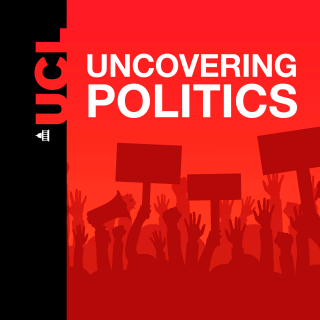
A COP taking place in Africa underlines many of the pressing issues that delegates will face. How can justice be achieved for those countries that are least responsible for CO2 levels, but often the most damaged by climate change? And how can such a large-scale event, bringing people together from around the world, be run without in itself creating more environmental damage?
This week we are joined by Dr Simon Chin-Yee, Lecturer in International Development in the UCL Department of Political Science and Professor Mark Maslin, Professor of Earth System Science in the UCL Department of Geography.
Africa and Climate Justice at COP27 and beyond
Colleagues from UCL Geography and UCL Political Science contributed to this fascinating cross-disciplinary paper, which urged for climate justice to be at the heart of the COP27 negotiations in Sharm El Sheikh.
The COP27 carbon footprint calculator
UCL presents the COP27 carbon footprint calculator - calculate the carbon footprint for travel to COP and offset it in line with best-practices.
Each year, heads of state and climate experts meet at COP to negotiate international climate change policy. However, global summits such as COP have an environmental impact of their own due to travel, accommodation, energy, water, and waste. How should we measure and mitigate the impacts of COP to ensure that, in working to combat climate change, we do not inadvertently exacerbate it?
Last year, 60% of the greenhouse gas emissions from COP26 were attributed to international travel. Researchers from UCL, including colleagues from the Faculty, created a tool to calculate the carbon footprint of travel to this year’s COP in Sharm El-Sheikh, Egypt. It shines a spotlight on the impact of travel and provides the means to mitigate and offset this part of its footprint.
Image
- Credit: flickr / UN Climate Change (CC BY-NC-SA 2.0)
 Close
Close

